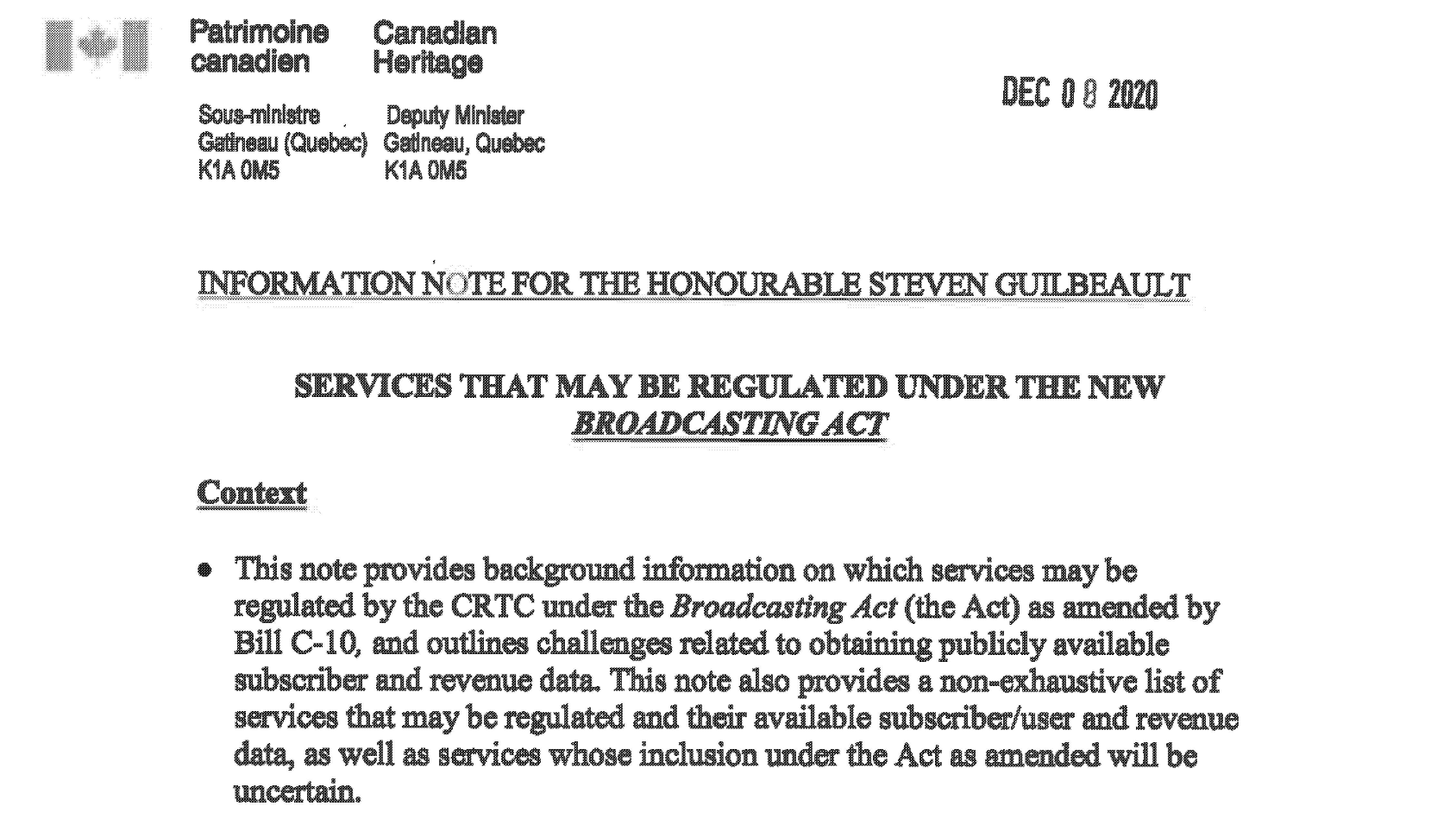
Canadian Heritage Memorandum, December 8, 2020, ATIP A-2020-00498
Bill C-10
Bill C-11’s Foundational Faults, Part Two: The Regulate-It-All Approach of Treating All Audio-Visual Content as a “Program”
My first post in a series on foundational faults in Bill C-11 focused on the virtually limitless reach of the CRTC’s jurisdictional power over audio-visual services. The starting point in the bill is that all audio-visual services anywhere in the world with some Canadian users or subscribers are subject to the Canadian jurisdiction and it will fall to the Commission to establish thresholds exempting some services from regulation. However, even with some exemptions, the Canadian approach will require registration and data disclosures, likely leading many services to block Canada altogether, reducing choice and increasing consumer cost.
The expansive approach in Bill C-11 isn’t limited to its jurisdictional reach, however. Not only does the law have few limits with respect to which services are regulated, it is similarly over-broad with respect to what is regulated, featuring definitions that loop all audio-visual content into the law by treating all audio-visual content as a “program” subject to potential regulation.
Lobby Harder: Canadian Heritage Minister Pablo Rodriguez Issues Industry Call to Action to Support Bill C-11
Canadian Heritage Minister Pablo Rodriguez appeared at the CMPA’s Prime Time conference last week, calling on the film, TV and broadcast sectors to become even more vocal in defending his Bill C-11. The bill, which has been the top lobbying priority of the sector for years, opens the door to regulating user generated content and asserts jurisdiction over all audio-visual services worldwide. There are several elements worth noting in the question-and-answer session with Rodriguez, not the least of which is the insistence on inaccurately claiming the new bill addresses concerns with regulating user generated content. When asked about the issue, Rodriguez responded:
Bill C-11’s Foundational Faults, Part One: The Nearly Unlimited Global Reach of CRTC Jurisdiction Over Internet Audio-Visual Services
My initial post on Bill C-11, Canadian Heritage Minister Pablo Rodriguez’s follow-up to Bill C-10, focused on the implications for user generated content. That post – along with this week’s Law Bytes podcast – notes that despite assurances that regulating user generated content is off the table, the reality is that the bill leaves the door open to CRTC regulation. Indeed, the so-called Online Streaming Act features an exception that means everything from podcasts to TikTok videos fit within the CRTC the power to regulate such content as a “program”. While this issue will rightly garner significant attention, it is not the only fault that lies at the very foundation of the bill.
The Law Bytes Podcast, Episode 116: Is This Podcast a Program Subject to CRTC Regulation Under Bill C-11?
The government’s Internet regulation plans were back on the agenda last week as a “what we heard report” was released on online harms and Bill C-11 – the sequel to last year’s controversial Bill C-10 – was introduced by Canadian Heritage Minister Pablo Rodriguez. The Law Bytes podcast will devote several episodes to the bill in the coming months. For this week, however, rather than inviting a guest to discuss a bill that people are still assessing, I appear solo and walk through the bill’s provisions involving user generated content. The podcast also highlights several ongoing concerns involving the near-unlimited jurisdictional scope of the bill, the considerable uncertainty for all stakeholders, the misplaced trust in the CRTC, and the weak evidentiary case for the bill.
Not Ready for Prime Time: Why Bill C-11 Leaves the Door Open to CRTC Regulation of User Generated Content
Canadian Heritage Minister Pablo Rodriguez introduced the much-anticipated sequel to Bill C-10 yesterday. The minister and his department insisted that the new Bill C-11 addressed the concerns raised with Bill C-10 and that Canadians could be assured that regulating user generated content is off the table. Unfortunately, that simply isn’t the case. The new bill, now billed the Online Streaming Act, restores one exception but adds a new one, leaving the door open for CRTC regulation. Indeed, for all the talk that user generated content is out, the truth is that everything from podcasts to TikTok videos fit neatly into the new exception that gives the CRTC the power to regulate such content as a “program”.











